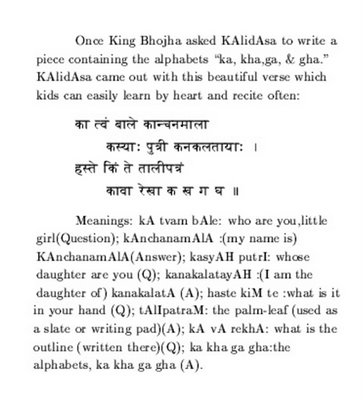
Lots of coincidences lead me to this post.. the Ramnaam Sankirtan that I went to yesterday evening (which essentially is the whole of Ramayana in a nice musical composition of 108 lines), an article on timetravel and parallel worlds that a friend of mine is writing, which reminded me of the quote from Yogavasishtha, and of course the sanskrit trivia that I have been posting on my blog.. But the final trigger was this morning while flipping channels thro' those sunday morning sermons on TV, I got stuck to WETA for whatever reasons where the author of a book (he is perhaps not a priest, but mostly a christian), was mentioning how his book has 18 chapters (I believe the name of the book is "inspirations" and the cover pic is that of the author with a butterfly sitting on his finger)
He went on to say how nice the number 18 is.. 1 representing I, and 8 representing infinity (the symbol turned 90 degrees). Before I could stop wondering where he would have got the idea of the infinite, instead of the "Father in Heaven", he blurted out those magic words... "Like the 18 Chapters of the Bhagavad Gita" !!
*************************************
These excercises are what I call as spiritual trivia... perhaps not as serious or even as "authentic" as philosophy may be, but delightful in its own right... Indeed 18 is a sacred number for Hindus (well, u may ask what is NOT sacred for the Hindu, but never mind).. the 18 Puranas, the 18 days of the Mahabharata war, the 18 chapters of the Gita,... and so on...
And so is also 108. I leave this number to the wonderful skills of Dr Subhash Kak -
article1 and
article2 .. but wanted to extend the 108 analysis to the idea of the "I" and and the "Infinite".. So then, what does Zero represent ?
One might think zero represents "surrender of ego". Reduce the "I" to "Zero" and you will be the infinite.. Not bad eh ?... remember that beautiful example given by Vivekananda ?
One day a drop of water fell into the vast ocean. When it found itself there, it began to weep and complain just as you are doing. The great ocean laughed at the drop of water. "Why do you weep?' it asked. 'I do not understand. When you join me, you join all your brothers and sisters, the other drops of water of which I am made. You become the ocean itself"I would also extend this to the very beginning shlokas of Yogavasishta... A little yet powerful equation is given in there.. "Yoga Chithavrithi nirodha".. Arresting or rather stabilising or focusing your chitha (mind/thought) is Yoga (union). Union of what ? "I" the Jivatma and "Infinite" the Paramatman.. and what is it that joins them ? Chitha Vrithi Nirodha .. A "Zero".... Mind you Zero is not essentially absence of everything. It is one-pointedness. Like how in Mathematics, a point, is a zero-dimensional object, theoretically.. A point is NOT nothingness, its something- but zero-dimensional.. And this great idea seems to be expressed in numbers in that beautiful little number - 108 !!
********************************************
Leaving thoughts : 108 beads of the Japa mala.. umm seems to be very important for Buddhists as well.. and may be even in other cultures other than the indic, for example, the picture above is from ebay.. and it says "NICE ANTIQUE CHINESE TURQUOISE 108 BEADS NECKLACE"
Well, if the Sanskrit Dwaar, can mean the same as the English Door and the Russian Dver......







